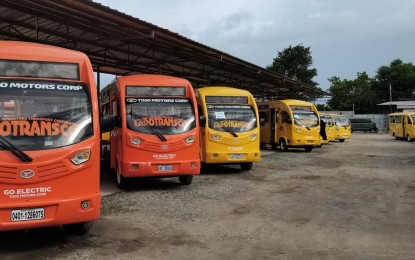
(File photo)
MANILA – The bills regulating the use of vintage and electric vehicles in the country have lapsed into law.
President Rodrigo Duterte allowed the two measures to lapse on April 15 sans his signature.
Under Republic Act (RA) 11697, a Comprehensive Roadmap for the Electric Vehicle Industry (CREVI) will serve as a national development plan for the electric vehicles (EV) industry to accelerate the development, commercialization, and utilization of EVs in the country.
The comprehensive roadmap includes four components – EVs and charging stations; manufacturing; research and development; and human resource development.
“The CREVI shall be incorporated in the Philippine Energy Plan and the National Transport Policy,” RA 11697 read.
The law designates the Department of Energy (DOE) as the primary agency tasked with the promotion of the adoption of EVs and the development of charging stations and related equipment.
The DOE, according to RA 11697, must promulgate “uniform and streamlines” rules and regulations on the use and maintenance of charging stations and related equipment.
It is also directed to convene within two months from the effectivity of the law and develop and update the CREVI, including the EV and charging stations component.
The DOE is also in charge of accrediting charging station providers, requiring the submission of charging infrastructure development plans, enforcing compliance with the installation of charging stations, and ensuring compliance with the Philippine Electrical Code and other relevant laws and orders such as Republic Act 7920 or the New Electrical Engineering Law.
The agency must also ensure compliance with the unbundling of charging fees by commercial use charging stations.
Under RA 11697, the Energy Regulatory Commission is directed to regulate the rates charged by distribution utilities on all charging stations.
The Department of Transportation is tapped as the primary agency tasked with the development of EV demand generation and the regulation and registration of EVs, while the Department of Trade and Industry will serve as the primary agency tasked with the promotion and development of the local manufacturing of the EV industry.
Local government units are directed to include green routes in their respective Local Public Transport Route Plans, issue certificates of inspection to charging stations, provide segregated lanes for light EVs on all major local and national roads, and submit a list of all commercial use charging stations in their respective localities to the DOE not later than January 30 of every year.
Vintage vehicles
Meanwhile, RA 11698 regulates the use and other activities related to vintage automobiles and other historical, classic, or collector motor vehicles.
RA 11698 or the Vintage Vehicle Regulation Act applies to all aspects of the regulation of the importation and exportation, registration, and use of vintage vehicles.
Under the law, registered vintage vehicles will not be required to meet clean-air, anti-pollution, safety, road-use, and other standards that were not in force at the time of their manufacture, either as a condition for their registration and use on public roads or otherwise.
The exemption is in recognition of the vintage vehicles’ small number, expected limited use and the historical fact that the technology available at the time of their manufacture will not permit them to meet modern standards.
“However, vintage vehicles manufactured after December 31, 1967 must be fitted with safety belts as mandated by Republic Act 8750 or the ‘Seat Belts Use Act of 1999,’” the law read.
Vintage vehicles, whether concours, RESTOMOD and/or for repair or restoration, authentic components, original or replica body shells, engines and transmissions, spare parts and accessories may be imported into the Philippines by any person or entity.
A vintage vehicle may be exported sans restriction, according to RA 11698.
However, vintage vehicles of Presidents of the Philippines, as certified by the National Historical Commission of the Philippines (NHCP) in accordance with rules and guidelines, can only be exported for the purpose of repair or restoration.
The NHCP approval is needed for the exportation of the vintage vehicles of Philippine presidents.
The Bureau of Customs, for purposes of valuation for tariffs, import duties and other taxes of imported vintage vehicles, is tasked to differentiate concours, RESTOMOD and for restoring vintage vehicles.
Restoration shops and companies importing and exporting vintage vehicles will be eligible to avail of the fiscal and tax incentives provided in RA 11594.
“The prohibition on the importation, registration and use of right-hand drive vehicles shall not apply to vintage vehicles manufactured on or before December 31, 1970 or to vintage vehicles intended principally for racing or other motorsports,” the law read.
Ras 11697 and 11698 take effect after 15 days following the completion of its publication in the Official Gazette or a newspaper of general circulation.
LTOs’ extension office
Two other measures converting the extension office of the Land Transportation Office (LTO) also lapsed into law on April 11.
RA 11692 converts the LTO extension office in Polomolok, South Cotabato into a “Class B” district office.
RA 11693, on the other hand, converts the LTO office in Pinamalayan, Oriental Mindoro into a district office.
Ras 11692 and 11693 require the Transportation secretary to include in the department’s program the operationalization of the converted LTO offices by including the funding in the annual General Appropriations Act.
Both laws take effect after 15 days following the completion of their publication in the Official Gazette or two newspapers of general circulation.
Malacañang released a copy of the laws on Tuesday. (PNA)
